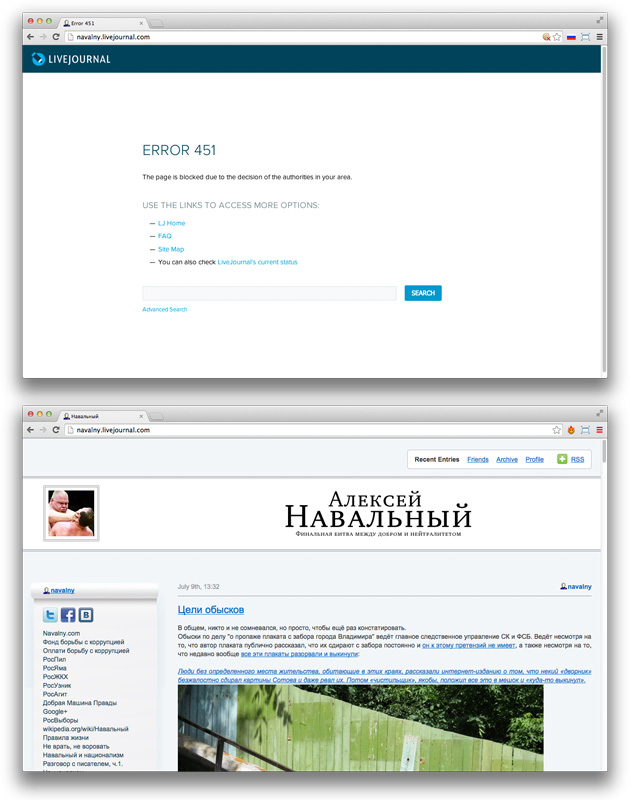The Russian government’s efforts to silence critics is getting help from an unlikely source: a San Francisco-based blogging company.
The company, LiveJournal, shows an error message to users inside Russia who try to read a blog maintained by prominent activist and politician Alexei Navalny, a vocal critic of Russian President Vladimir Putin. Navalny uses the service to post about Putin, the Russian government, and politics. Users in other countries can read Navalny’s blog without seeing the error message.
Founded in 1999 by American Brad Fitzpatrick, who now works at Google, LiveJournal is currently owned by Rambler Co., a Russian company that runs several news websites.
LiveJournal CEO Katya Akudovich declined to comment on the details of this story, citing time limitations due to a “major technical redesign” but told ProPublica, “I can reassure you that Rambler & Co. has no influence on LiveJournal Inc. whatsoever. LiveJournal Inc. is an American company that complies with all the U.S. laws. Our abuse team makes all of their decisions based strictly on our Terms of Service and the appropriate U.S. laws.”
An early social media pioneer, LiveJournal was once popular in the United States but is now dwarfed by sites like Tumblr and WordPress. The site does retain a smaller, dedicated following among Americans users, including George R.R. Martin, author of A Game of Thrones, who regularly posts on his LiveJournal blog. In Russia, LiveJournal is the most popular blogging platform—so popular, in fact, that the Russian name for LiveJournal has become synonymous with “blogging.”
Top: Attempts to access Navalny’s blog within Russia results in an error, in English, from LiveJournal. Bottom: Attempts to access the blog from a U.S. connection were successful.

LiveJournal has a history of being blocked by Russian authorities, and may be self-censoring to minimize the parts of their site that are unavailable inside Russia. The entire service was blocked in parts of Russia at least twice as a result of regional court decisions meant to block individual users. On March 13 of this year, Navalny’s blog, along with three Russian news sites, were officially ordered to be blocked by Russia’s telecom agency at the request of Russia’s prosecutor general.
When it was blocked by the government, users inside some Russian cities trying to visit the banned LiveJournal site would have seen an error message from their Internet provider, saying that the page was not accessible.
But in the current case, the error message appears to come from LiveJournal itself, at a LiveJournal URL and on a page that includes the company’s logo and design. The error reads, “The page is blocked due to the decision of authorities in your area.” The error message is in English, though Navalny’s blog is in Russian. Attempts to reach Navalny’s blog from a U.S. Internet connection were successful.
LiveJournal isn’t the only U.S. company that stops users in other countries from seeing content that local governments want banned. According to a recent story, a Marketplace reporter based in Shanghai posted a story to LinkedIn, and soon received a notification saying his post would be blocked because it “contained content prohibited in China.” In 2012, according to Der Spiegel, Twitter blocked a neo-Nazi’s account within Germany at the request of German officials.
Companies not cooperating with local governments can find their entire service censored, as Google learned when they said they would no longer self-censor search results in China, and was subsequently and repeatedly blocked by that country’s national firewall.
According to a study published last month by a group of censorship researchers, LiveJournal moved blogs blacklisted by the Russian government onto a separate IP address to facilitate Russia’s ability to selectively restrict access to parts of LiveJournal.
Tests by ProPublica confirm that Navalny’s blog has been hosted on a different IP address than the main LiveJournal site for at least the past two weeks.
LiveJournal founder Fitzpatrick says there was no censorship by foreign governments when he ran the company from 1999 to 2006. “There were teachers or parents complaining,” he said, “but there were no rules.”
Anil Dash, an employee at SixApart when it owned LiveJournal, first became aware of country-wide Internet censorship in 2004, when a different site owned by SixApart, Typepad.com, saw its first drop in traffic caused by it.
“Typepad was first, where we noticed this traffic drop one day, and we asked: What’s going on? We weren’t getting any traffic from China. We thought it was a technical issue,” he said.
“We were talking to our counterparts at Google, who were running Blogger, and they were having the same problems,” Dash said. “That was the first time—honestly at least for both of these teams—the first that either of us had heard about this [blocking] capability at all.”
Dash doesn’t envy LiveJournal if indeed they’re blocking Navalny after being faced with a choice between blocking him and being shut down in their biggest market.
Hypothetically, if that was the choice, “even if [LiveJournal] has to censor a million people, the other 2.9 million might be worth it for [the company],” he said.
This post originally appeared on ProPublica as “U.S. Company Helps Russia Block Prominent Putin Critic” and is republished here under a Creative Commons license.




